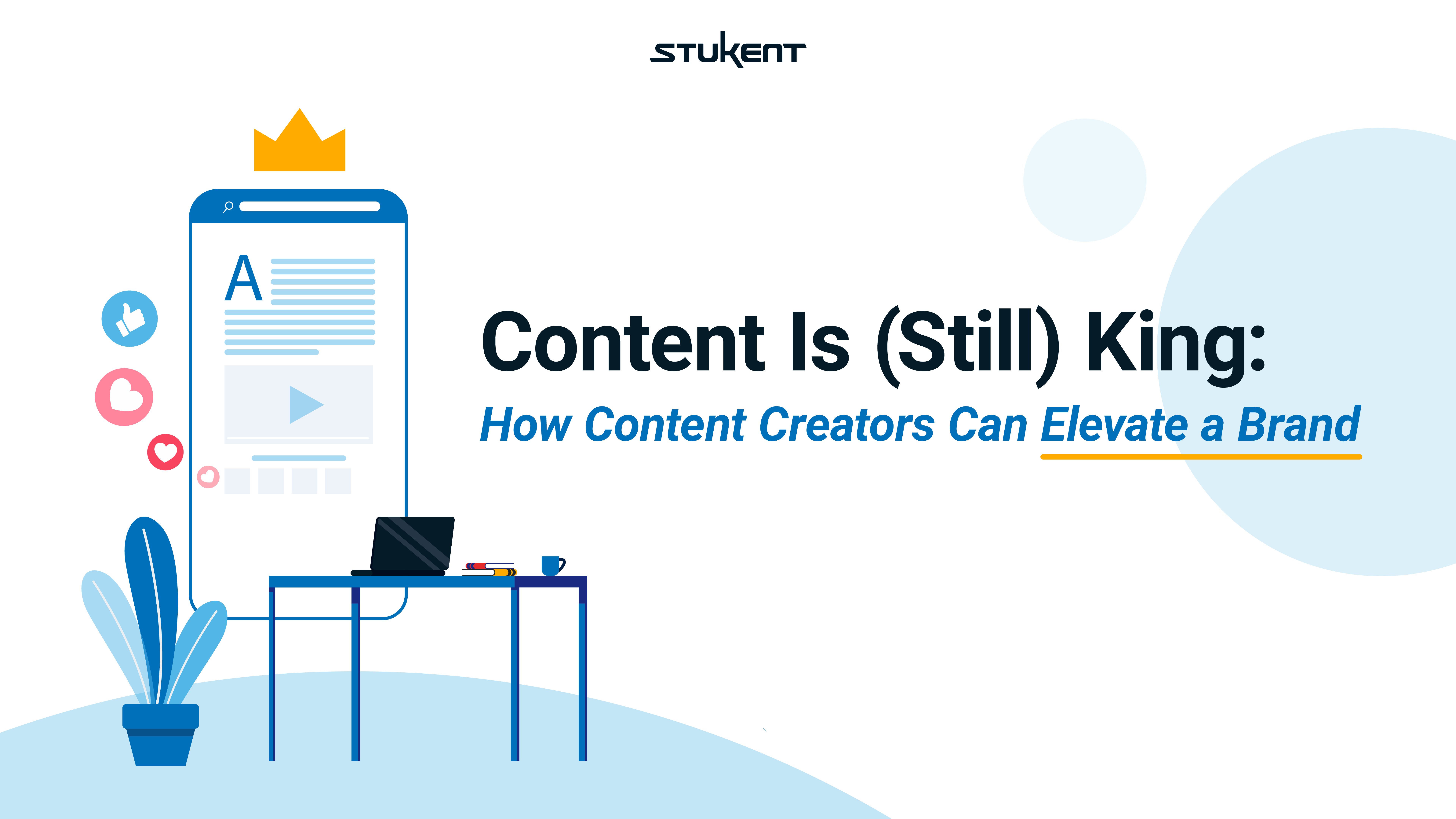Consumers today are overwhelmed by a constant stream of social media posts, short-form videos, podcasts, blogs, vlogs, advertisements, and more. If marketers want to capture audiences’ attention, they must create relevant content for their campaigns. Consistent content establishes a brand or business’s authority on a topic, improves website SEO, and builds relationships with their target audiences.
To bring a fresh, relatable voice to marketing messaging, brands can utilize the skills and influence of a content creator.
Content creators can be powerful social media marketing allies. “In fact, ‘consumers trust content from their peers more than they do any form of marketing communication,’” says Michelle Charello in Stukent’s “Essentials of Social Media Marketing” courseware. “Brands are able to harness the power of [user-generated content] to showcase their stories and build trusted relationships with customers.”
So, how are today’s social media marketers implementing content creators into their own campaigns? Or how can your students leverage their own talents to become content creators themselves? Read on for the Stukent team’s tips, tricks, and best practices! You can also request free access to Charello’s “Essentials of Social Media Marketing” courseware and simulation for your classroom, which provides a modern, well-rounded curriculum for social media marketing.
Content Creators ≠ Influencers
A content creator’s job is in their title — they create videos, photos, graphics, vlogs, blogs, podcasts, how-to guides, and more. Their content seeks to engage, educate, and entertain their audiences. And while people use the terms content creator and influencer interchangeably, they aren’t one and the same.
Content creators make professional-quality content and include photographers, videographers, artists, and writers. Influencers focus on engagement, relationships, and community building to connect with audiences, including YouTube vloggers, reviewers, and lifestyle gurus. While the role of content creator and influencer may overlap — content creators may influence audiences and influencers may create content — their professional goals, intentions, and methodologies are different.
Influencers are “social media personalities who … influence their followers to do or buy something,” according to Chloe West of Sprout Social. “These are [the] fitness Instagrammers who share protein shakes. … The beauty gurus who link each of their eyeshadow palettes. … The fashionistas who post new #ootd (outfit of the day) photos.”
Alternatively, creators are driven to create content for the sake of great content — their work drives user engagement. Content creators are the yoga instructors creating 20-minute videos on YouTube; the graphic designers creating in-depth infographics on political topics; and the videographers who create stunning day-in-the-life videos that take audiences on journeys all over the world.
Content creators are often at the center of important conversations online and can be trendsetters, too. Brands can leverage creators’ skills to strengthen their messaging, giving their content more personality and perspective than it otherwise may have had. Better yet, content creators tend to be very agile, which makes them a great supplementary resource to in-house marketing content.
Connecting Brands to Creators
Over the last few years, social media platforms have developed ways to support content creators on their sites. Content creators drive views, engagement, and ultimately, revenue — which means they are vital to the continued success of any social media platform.
Many social media platforms are now investing in the creator economy: YouTube, TikTok, Snapchat, and Facebook have established various funds to support the content creators who drive the most traffic to their app via views and engagement. And in 2021, Instagram hosted its first-ever Creator Week, which was a three-day event that aimed to “empower the creator economy” on the platform.
Additionally, social media platforms have built spaces that help brands connect with creator collaborators. For example, Twitter ArtHouse “helps curate best-in-class Creators to develop ideas and assets on behalf of brands. … Artists represent the slate of illustrators, animators, and videographers who bring craft to content” to engage a brand’s target audience on Twitter. Facebook, Instagram, and YouTube have similar services that help brands discover and partner with top creators across the world.
YouTube’s BrandConnect makes it easy “for creators and brands to create branded content that is both authentic and effective. [Their] focus … [is] to be supporting and driving revenue to creators, providing measurable campaigns for brands, and reaching views with authentic and relevant content.” YouTube uses insights-based matchmaking tools to help brands find the best creators for their content, which produces engaging, “highly-relevant” content.
These mutually beneficial programs compensate content creators for their work, help brands develop authentic content, and engage users on a social media platform.
And what’s more? “Consumers are also becoming content creators for brands on social media,” Charello says, “[and produce] highly valuable user-generated content.” Brands are able to harness the power of user-generated content to “showcase their stories and build trusted relationships with customers.” With a little research, brands can partner with content creators who are already advocating for their products or services — making it even easier to find the right fit for a campaign.
How Brands Can Collaborate with Creators
If leveraged strategically, content creators can give a marketing campaign a powerful edge — which is why it’s critical for brands to collaborate with content creators who align with brand missions and visions. As brands step into the creator economy, they must work to select the right channels and content creators for their message. Authenticity is a perennial trend in social media marketing: “If there’s one certainty in social media,” writes Katherine Kim for Sprout Social, “is that people can sniff out a fake partnership a mile away.”
When partnering with a content creator, marketers should keep the following best practices in mind:
- Find engaging, relevant content creators in your space. Select channels with care, then reach out to content creators who share your values, resonate with your audiences, and who are passionate about your brand.
- Build a solid relationship. When brands build meaningful relationships with content creators, it shows. Brands should invest in their relationships with creators, recognize a creator’s value, and foster clear communication channels and transparency.
- Be reasonable with your expectations. Let the creator lead — not only do they know their audiences (and yours), but they’re familiar with current and emerging trends, too. Their authenticity will create stronger value for your brand, which in turn creates a more substantial return on investment.
- Give creators administrative support. Not every content creator has a wealth of business knowledge or experience, and navigating day-to-day administrative tasks may distract them from creating great content for your brand. To ensure a successful, rewarding relationship, it’s wise to streamline administrative processes such as invoicing and net payment terms.
- Representation matters. One size, color, orientation, or creed does not fit all! Work with content creators from marginalized communities to widen your campaign’s appeal and bring more depth to your messaging.
Content creators can bring an authentic, fresh voice to a brand’s marketing campaign. When brands partner with creators who share their vision, their values, and their passion for their products and services, they can create truly remarkable content that doesn’t just resonate with audiences — it converts them, too.
To get FREE instructor access to Michelle Charello’s “Essentials of Social Media Marketing” courseware or Stukent’s Mimic Social simulation, visit our website. Or, see Stukent’s Mimic Social simulation in action and schedule a demo with a Stukent course consultant.






